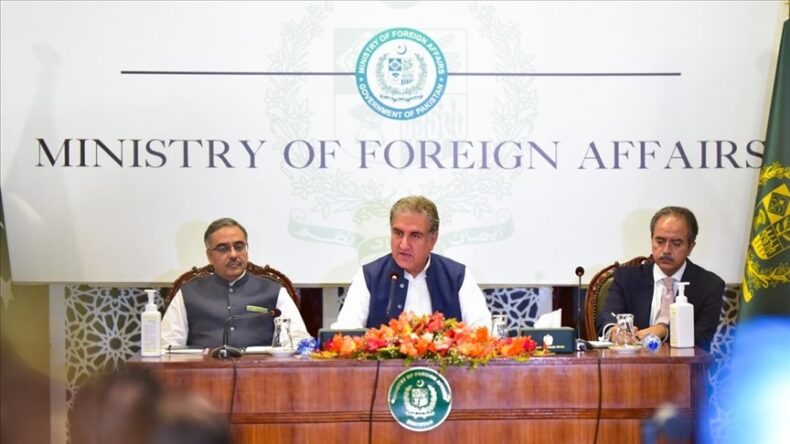Pakistan Regarding the Taliban: Bilawal Bhutto Zardari suggested that the U.S. engage the Taliban in Afghanistan more directly.
When it comes to battling foreign extremist organisations and the economic and humanitarian crises in that nation, the international community should work with Afghanistan’s ruling Taliban, not against it, according to Pakistan’s foreign minister, despite the fact that many U.S. officials claim the Taliban have shown themselves to be unworthy of such cooperation.
Pakistan’s top diplomat, Bilawal Bhutto Zardari, spoke to The Associated Press in the closing days of a trip to the UN General Assembly in New York and Washington, which was aimed at trying to raise awareness of the extraordinary flooding that has one-third of his country underwater throughout the world.

More than 1,000 people have died in Pakistan as a result of the relentless monsoon rains, which scientists believe are made worse by climate change. These rains have also destroyed tens of billions of dollars’ worth of crops and caused billions of dollars’ worth of damage.
One of the several nations most severely impacted by climate change, Pakistan has been vocal in its demand for additional financial aid from wealthy countries. The United States, China, and other major nations’ recent and past economic and industrial expansions are the main contributors to climate change, which is mostly brought on by burning fossil fuels.
According to reports, the floods have displaced almost 30 million people in Pakistan, who “really pay in the forms of their lives and their livelihoods for the industrialization of other countries,” added Zardari.
Justice, he continued, “would be that we cooperate internationally so that we are not left to deal with the effects of this tragedy alone.”
Zardari is the son of a former president and a former prime minister of Pakistan. In April, he was appointed foreign minister.
On Monday, he had a meeting with Secretary of State Antony Blinken. On the same day, the Biden administration announced an additional $10 million in food aid for Pakistan, on top of the more than $56 million it has already provided in flood relief and other humanitarian aid this year.
More generally, however, the $100 billion in annual aid that the Biden administration and other governments of advanced economies have promised to provide to assist less developed countries in surviving the droughts, rising seas, and other natural disasters caused by climate change and transitioning to cleaner energy themselves has only been partially delivered.
We anticipate the United States to be one of the key players in that, said Zardari, who also expressed support for a recent U.N. proposal that would allow developed countries to forgive past debt as a form of climate aid.
In terms of the overall climate aid, he said, “We haven’t seen — and that doesn’t mean we won’t see — the translation of this vision to practicality on the ground.”
In his Tuesday interview with the AP at Pakistan’s embassy, Zardari also made controversial suggestions. Over the years, Pakistan and the United States have cooperated against deadly armed groups hiding in Afghanistan in significantly differing degrees. Over its lenient treatment of and support for the Taliban, the United States has long had a tense relationship with many Pakistani officials.
No nation recognises the Taliban, a group that has been designated a terrorist organisation and that retook control of Afghanistan by the use of force in August 2021, as the country’s official government. With as little Taliban involvement as possible, the United States and the international community have attempted to deal with the billions of dollars in frozen cash from the Afghan Central Bank, enact financial reforms, and provide much needed relief to ordinary Afghans.
“At the risk of offending anyone, I think it’s vital to stress that these funds are not the Taliban’s or the Americans’ funds. The Afghan people are the rightful owners of this funds, according to Zardari.
He asserted that economic isolation and deprivation, such as what Afghanistan has through since the Taliban took control, only serve to strengthen authoritarianism and extremism. The best financial results would come from using the currently controlled by the Taliban institutions rather than “some type of parallel government.”
When asked if he meant that the U.S. needed to deal with Afghanistan’s ruling authority, Zardari replied, “Pretty much.”
Meanwhile, American commanders have denounced Taliban officials for apparent collaboration after learning that Ayman al-Zawahiri, the head of al-Qaida worldwide, had sought safety in the centre of Afghanistan’s capital since the Taliban had retaken control. Zawahiri was assassinated by the US in a drone strike in July.
Zardari claimed that the Taliban lacked the time and resources necessary to combat terrorist organisations in the way that a government should. Before passing judgement on them, he said, “we need to help them strengthen their capacity to also do so” so that they can show their willingness to confront terrorist organisations.
Read More:https://tdznkwjt9mxt6p1p8657.cleaver.live/












